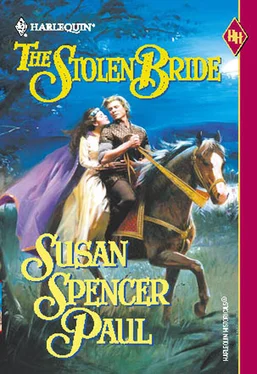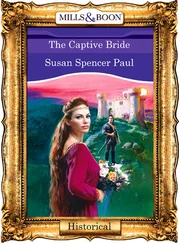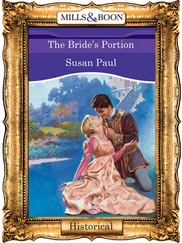1 ...6 7 8 10 11 12 ...16 When they neared the forest, Kayne at last reined the majestic beast in, slowing his pace by degrees. Just as he had been during their years together in France, Tristan was instantly obedient to his master’s will. Without such obedience, Kayne knew, he’d have been long dead. More times than he could recall it had been Tristan’s perfectly honed skills as a warhorse that had kept them both alive.
It was an easy matter to find the place where he needed to turn in, though it was not always so in the midst of those nights when he journeyed to the forest. Tonight, however, the moon was nearly full, giving plenty of light for such late wanderings. Tomorrow night, Kayne thought, glancing upward, ’twould be even brighter, and all those celebrating Midsummer Night would rejoice to have their dancing and feasting made that much more pleasant.
Sofia, especially, would enjoy herself. She had a gift for happiness; one that he envied greatly. He could almost envision her now, with her long golden hair unbound and flowing free, crowned with a circlet of flowers and swaying like the finest silk cloth as she danced about the bonfires. She’d have no lack of partners. Nay, she’d suffer quite a different trouble by having far too many vying for her hand, both young and old alike.
It wasn’t far to the clearing which was his destination. Senet and John were there before him, waiting.
“Where is Aric?” Kayne asked as he brought Tristan to a halt. He dismounted with ease as the other men approached, and held out a hand in greeting.
“His wife, Magan, is heavy with child,” Senet Gaillard, the lord of Lomas, replied, clasping Kayne’s arm in the manner of long friendship, “and he will not leave her for fear that the babe might come with him gone. ’Tis good to see you again, Kayne. You are well?”
“Most well, as you see,” he assured him before turning to greet the other man. “John, well met.”
John Baldwin, who had recently become the lord of Cap-well, shook his hand warmly.
“Aye, indeed, Kayne. I was sorry not to come when Senet and Aric last met you here, and so had to come this time. Clarise sends her warmest love.”
“Give her my thanks, and send my own affections in return. She is well and happy? But I think she must be, now that you are wed.”
John smiled and nodded. “Most happy, we are, the both of us. But what of you? Your burns are much healed from what I saw many months ago.”
“He has the lady of Wirth to thank for it,” Senet said, grinning at Kayne. “A very beautiful lady, from what is told of her, and most attentive to our Kayne. Mistress Sofia Ahlgren is her name, but to hear the words fall from his lips, you would think her named ‘Loveliest Angel,’ instead.”
Kayne scowled at him. “You are pleased to make jest, yet there is nothing more to Mistress Sofia’s kindness than mere Christian duty, and nothing more to my speaking of her than gratitude. But you did not ride so far in the dark of night to speak of such things. Something is amiss if you come to meet with me again, so soon after our last parting, and only a day before Midsummer Night. You’ll wish to be home with your wives on the morrow, and not here with me. Though I am not sorry to see you, of course.”
“Nay, of course not,” Senet replied with a raised eyebrow. “But it may seem so, as you refuse to let us come to your home, as friends might expect to do.”
“You know why it must be so,” Kayne said quietly, grieved in his heart to treat his dearest friends—men who were as his own brothers—in such a manner. They had been inseparable during the ten years they’d spent together fighting in France, and nothing save death could have parted them. But once they’d returned to England, Senet, Aric and John had taken wives and set up their own estates within miles of each other. They had begged Kayne to do likewise, and take the fortune he’d amassed during his years at war and become master of his own land and manor house. But his soul had been too darkened to carry on a life of planting fields and overseeing servants and vassals and pretending that all was well. Too much of him had died during the war to let him live in that manner.
He had craved solitude and peace, and above all, namelessness—to put his old self away forever and never embrace it again. But becoming unknown had required great sacrifice. He could leave Wirth to visit his friends, but he could not receive their visits in his home. If any of the villagers saw Senet or John or Aric, they would know at once who Kayne was, and what he had once been, and the small measure of peace he’d striven so hard to gain would be lost. He would have to leave Wirth…and Sofia…and begin all over in a new place. If he could find one.
It had taken months of hard searching to find Wirth, and he’d been especially glad of it for it kept him so close to his friends. Only twenty miles separated him from Senet and Aric, and another ten from John. He did not like to think of being farther away, in case they should ever need him, and because of this, he stood firmly in his determination to keep his friendship with such noblemen—famed warriors all—a secret.
“Aye, we know,” Senet said more kindly. “My prayer is yet that you will one day come to yourself again, and cease such solitude. If you had gone into a monastery and taken vows, you could be no less cloistered than you are now.”
It was true. Kayne had even considered taking such vows when he’d first begun to seek peace. He might have done so, if not for the vow of celibacy. He was not a man given to much dallying with women, but neither was he a man to forever deny himself the company of females. Even if he’d been able to conquer outright lust, desire was something he knew he would never vanquish.
“Kayne,” Senet said, the timbre of his voice changing, growing sober and serious, “there is indeed a certain task that causes us to come to you this night. I’ve had a missive from your father.”
Kayne looked sharply at his friend. “From my sire, you mean. I have no father, though I might name Sir Justin such, as he was a father to us all when we were boys.”
“Aye, Sir Justin was truly a father to the fatherless,” John agreed, “but you were more fortunate than the rest of us, Kayne. You knew your parents—both mother and father, even if your father never claimed you as he should have done.”
“Neither my mother, may God assoil her, or me,” Kayne said tightly, hot anger seeping through every pore. “I’ve tried not to hate the man, but the truth cannot be denied. He used her for his pleasure—a simple serving maid who knew no better than to love her lord—and when she found herself with child, he sent her away with naught but what she could carry.”
Senet stepped forward. “I know you’re full angered with the man, Kayne, but you must realize that he did the best he could for her. He could have turned her out and left the both of you to suffer, but he sent her to Briarstone, where both she and you could be safe, and he sent money every quarter….”
“Don’t speak of it!” Kayne shouted furiously, turning away from them. “Money to buy her silence. And to keep the truth of who my father was a secret from one and all.”
“Nay, that is not why. Even your mother never thought that was so,” John argued gently, speaking with great care. “And when she died, Lord Renfrow sent for you, to bring you back to live with him at Vellaux. He did not want you to be alone, once she was gone. ’Twas your own stubbornness that kept you from going.”
“I never would have put myself in his grasp,” Kayne muttered with a shake of his head. “By then he was only desperate for an heir. The wife he’d taken after sending my mother away never gave him a child—nor did any of his other women. I only became of import to him when he began to fear that he’d die without a child of his loins to inherit his grand titles and estates. If God had blessed him with other sons—legitimate sons—he would have forgotten me entirely.”
Читать дальше












